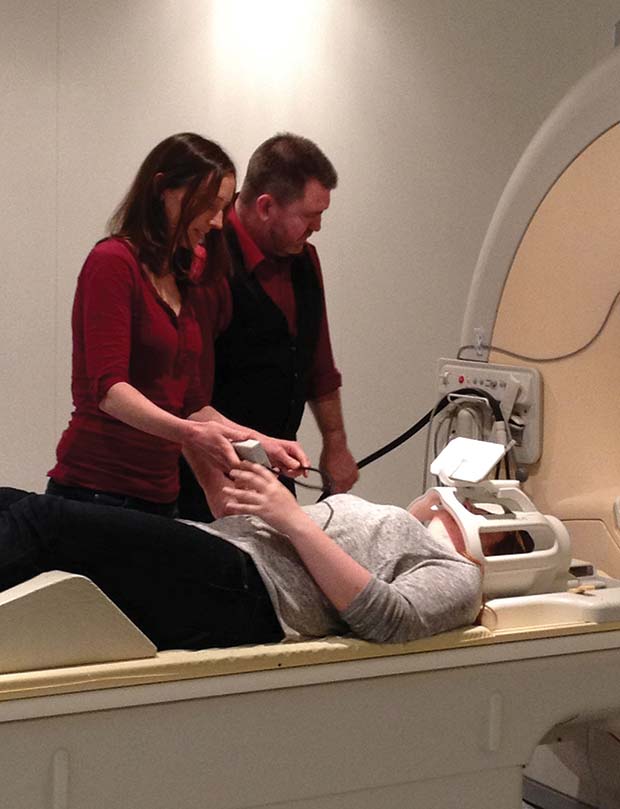Shoppers over the age of 40 are less likely to spot bargains in supermarkets than younger customers, according to startling new brain scanner research by one of Europe’s leading shopping behaviour specialists.
 While younger shoppers are quick to spot a good deal, the over-40s either struggle to calculate value for money or mistakenly rely on their own instincts, and so often miss out on bargains or spend more than they need to.
While younger shoppers are quick to spot a good deal, the over-40s either struggle to calculate value for money or mistakenly rely on their own instincts, and so often miss out on bargains or spend more than they need to.
The difference in the way people shop according to age is just one of the results from a ground-breaking project being carried out jointly by UK-based SBXL and the leading School of Psychology at Bangor University. Selected shoppers are asked to simulate an £80 grocery shop in a supermarket, while going through a £3 million 20-ton medical fMRI scanner.
A full range of supermarket products is displayed on a screen in front of them and they are asked to make normal shopping choices from a shopping list while faced with a wide range or promotions and special offers. The aim is to identify which part of the brain is involved in making choices by measuring blood flow and brain activity.
Early results from the research show that shoppers in their 20s and 30s can calculate value for money quickly, and are more resilient to the huge amount of information coming at them in a typical supermarket shop. The over-40s are slower to process information and end up guessing which offers and promotions are good value.
But the project has disproved earlier research which suggested that after around 23 minutes into their shop, customers begin to make choices with the emotional part of their brain – which can only guess at value for money -rather than the cognitive part of the brain which is capable of computation and logical decision-making. The brain scan results suggest that shoppers get better at working out good value the longer they spend in the shop. Although results also show that after more than 40 minutes – the time taken for a typical weekly shop – the brain gets tired and begins to shut down, ceasing to form rational thoughts.
The cutting-edge project is being sponsored by three multi-national grocery and healthcare companies, together responsible for more than 20 household brands found in shops and supermarkets, ranging from beauty products to canned vegetables. The companies are keen to find out how shoppers respond to special offers and promotions, what their attention span is, and how capable they are of ignoring brands which surround those on offer.
The state-of-the-art fMRI scanner is based at Bangor University. The equipment was originally developed for medical purposes, identifying brain tumours and scanning for brain defects and dysfunctional brain activity. But now it is increasingly being used for commercial research.
Bangor University’s School of Psychology, established in 1963, is acknowledged as one of the leading psychological institutions in the UK, both for its research and its teaching.
SBXL’s managing director Philip Adcock said some of the early brain scan results were surprising.
“We are actually discovering that the brain is more resilient in a supermarket shop than some research suggested. This could be a kind of evolution as the brain gets used to the supermarket environment. However, the difference in responses from different age groups was surprising – this is something which hasn’t been shown in more conventional research,” he said.
Senior lecturer in psychology at Bangor University, Dr Paul Mullins said, “We are really excited about this new research. Our 3T MRI system allows us to investigate the neural basis of decision making. Using advanced brain imaging techniques we are getting a better understanding of how shoppers respond to special offers. This also gives us the chance to bring our research on decision making into a real world context, and we hope will tell us a lot about how we respond to different types of competing information in the world around us.”
Phillip Adcock added, “The research findings confirm that for many people a supermarket shop is a stressful experience and the brain behaves illogically when faced with the sort of information overload that shoppers are faced with in a typical supermarket. Now we have a reliable and scientific way of validating this research and understanding exactly what is happening in the brain during the weekly shop.
“Around a quarter of all products on supermarket shelves are on some kind of offer or promotion, so we are talking about many millions of pounds at stake in lost margins if the supermarkets are getting it wrong. We estimate that supermarkets and brands consistently give away 23 per cent more margin than they need to.”
SBXL, with offices in Lichfield and Tamworth, is a leading international retail research firm, combining state-of-the-art technology with a detailed knowledge of human psychology. As well as regular shopper tracking, the company provides retailers and brands with in-depth insights, using techniques such as in-store filming to capture behaviour, The company also provides detailed studies of facial expressions and non-verbal communication to identify sub-conscious decision-making processes, and eye-tracking to determine what shoppers see in-store.
The company works with leading retailers and brands across Europe, North America and the Far East.
Shopping Behaviour Xplained Ltd
Tel: 01827 56970



Comments are closed.